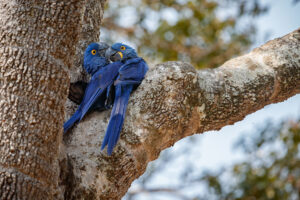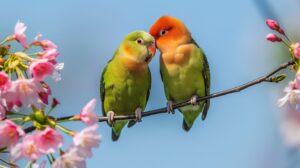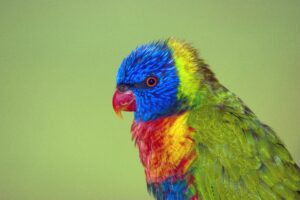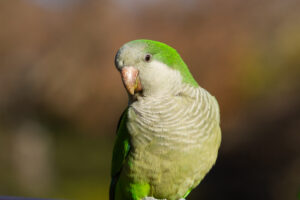Introduction
The dusky-conure (Pyrrhura molinae) has captured the hearts of bird enthusiasts across the United States with its charming personality, manageable size, and beautiful plumage. As a medium-sized parrot native to the forests of South America, the dusky-conure represents an excellent choice for both first-time bird owners and experienced aviculturists seeking a delightful avian companion.
Whether you’re considering adding a dusky-conure to your family, have recently welcomed one into your home, or are simply curious about these fascinating birds, this comprehensive guide will provide you with everything you need to know about the dusky-conure – from care requirements and behavioral traits to lifespan expectations and dietary needs.
Unlike some of their louder parrot cousins, the dusky-conure offers a more apartment-friendly noise level while still providing the interactive companionship that makes parrots such beloved pets. Their intelligence, trainability, and moderate talking ability make them engaging companions that can form strong bonds with their human caregivers.
In this detailed exploration, we’ll dive deep into what makes the dusky-conure such a special addition to the right household, covering essential topics like proper cage setup, nutritional requirements, training techniques, and health considerations. We’ll also compare the dusky-conure to similar species like the green cheek conure to help you determine if this particular bird matches your lifestyle and expectations.
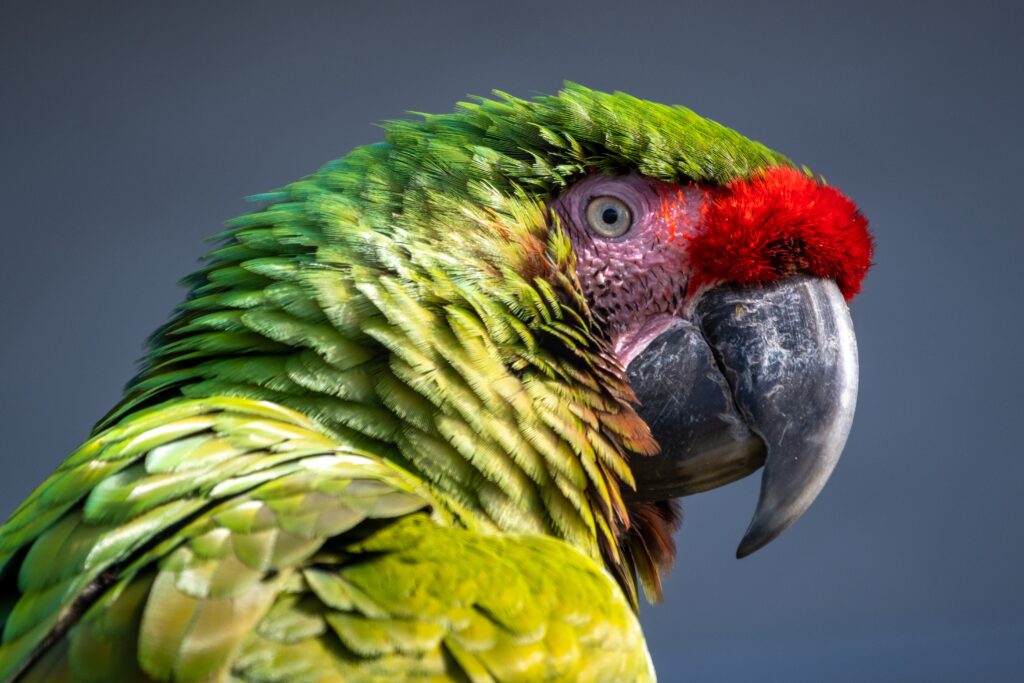
Understanding the Dusky-Conure: Species Profile
The dusky-conure belongs to the Pyrrhura genus within the larger parrot family. Sometimes called the Molina’s conure, this bird features distinctive coloration with primarily olive-green plumage, a gray head, and maroon patches on its belly. One of the most recognizable characteristics of the dusky-conure is the whitish to gray scalloped pattern on its chest, giving it a distinctive “scaled” appearance.
Natural Habitat and Origins
Native to the forests of Bolivia, Argentina, Brazil, and Paraguay, the dusky-conure naturally inhabits woodland areas and forest edges. In the wild, these birds live in flocks ranging from 10 to 30 individuals, demonstrating their naturally social nature. The dusky-conure’s natural environment informs many of their behavioral traits and needs as pets.
Wild dusky-conures spend their days foraging for food, socializing, and finding shelter in tree hollows. Understanding this natural lifestyle helps owners provide appropriate enrichment and care for their pet dusky-conures. Although they have adapted well to captivity, they retain many of their wild instincts and behaviors.
Physical Characteristics
The average dusky-conure measures approximately 10-11 inches (25-28 cm) in length, with nearly half of that length coming from their tail. Their weight typically ranges from 70-95 grams, making them a medium-sized conure species. The dusky-conure size places them between the smaller green cheek conures and the larger sun conures.
While the standard dusky-conure colors feature the olive-green and gray pattern described above, some color variations exist within the species. Their beaks are black, and they have distinctive bare white eye-rings that contrast beautifully with their plumage. Males and females appear virtually identical, making visual sexing nearly impossible without professional methods.
Dusky-Conure Lifespan
When properly cared for, the dusky-conure lifespan typically ranges from 20 to 30 years, with some individuals living even longer. This considerable longevity makes adopting a dusky-conure a significant long-term commitment – one that spans multiple decades of your life. The dusky-conure lifespan is comparable to many medium-sized parrot species and represents a substantial time investment for potential owners.
Factors affecting dusky-conure lifespan include:
- Diet quality and nutritional balance
- Exercise and environmental enrichment
- Regular veterinary care
- Proper housing conditions
- Genetic factors
- Stress levels
With proper care, your dusky-conure can be a companion for a significant portion of your life, making the decision to adopt one a serious consideration that should not be taken lightly.
Dusky-Conure Behavior and Temperament
Understanding the natural behavior and temperament of the dusky conure is essential for providing appropriate care and building a strong relationship with your feathered friend. Dusky-conure behavior is characterized by several distinct traits that make them popular as pets.
Natural Behaviors
In the wild, dusky-conures are highly social birds that live in flocks. This social nature translates to captivity, where they thrive on regular interaction with their human caregivers. A key aspect of dusky conure behavior is their need for daily social engagement; without it, they may develop behavioral issues.
Typical dusky-conure behavior includes:
- Climbing and exploring their environment
- Chewing on wood and other materials
- Foraging for food
- Bathing and preening
- Vocalizing to communicate
- Playing with toys and objects
Dusky-conures are active birds that require several hours outside their cage each day for exercise and mental stimulation. They enjoy climbing, swinging, and investigating their surroundings with their beaks.
Dusky-Conure Temperament
The dusky-conure temperament is generally described as friendly, playful, and affectionate. These birds form strong bonds with their owners and often enjoy cuddling and receiving head scratches. The dusky conure temperament is considered more relaxed compared to some other parrot species, making them suitable for families and individuals seeking a manageable avian companion.
The dusky-conure temperament can be characterized by:
- Affectionate nature toward bonded humans
- Moderate energy levels
- Playfulness and curiosity
- Intelligence and problem-solving abilities
- Sociability with family members
- Moderate territoriality
While individual personalities vary, most dusky-conures display a balanced temperament that combines playfulness with periods of calm. They’re known for their clownish antics and ability to entertain themselves and their human companions.
Dusky-Conure Personality Traits
The dusky-conure personality is often described as charming and endearing. Their inquisitive nature and social intelligence make them engaging companions that can recognize family members and form preferences for certain individuals. The dusky-conure personality typically includes a blend of independence and attachment to their human flock.
Common dusky-conure personality traits include:
- Curious and investigative behavior
- Playful interactions with toys and people
- Moderate neediness (less demanding than larger parrots)
- Adaptability to household routines
- Ability to bond strongly with multiple family members
- Gentle disposition with proper socialization
The dusky conure personality makes them particularly suitable for owners who want an interactive bird that isn’t overly demanding. They enjoy participating in family activities and will often perch on shoulders or nearby furniture to observe household happenings.
Dusky Conure Noise Level
One significant advantage of the dusky conure is their moderate noise level compared to larger parrot species. While no parrot is silent, the dusky conure noise level is generally considered apartment-friendly, consisting primarily of chirps, whistles, and occasional squawks rather than the ear-piercing screams of larger cousins like macaws or cockatoos.
The dusky conure noise level typically includes:
- Morning and evening “contact calls” (loudest vocalizations)
- Conversational chirps and whistles throughout the day
- Excited vocalizations during play
- Softer murmuring sounds when content
The dusky conure noise level increases when they’re alarmed, excited, or seeking attention, but their natural vocalizations are generally at a manageable volume that won’t disturb neighbors in most living situations. This moderate dusky conure noise level makes them popular choices for apartment dwellers who still want the companionship of a parrot.
Dusky Conure Care: Essential Guidelines
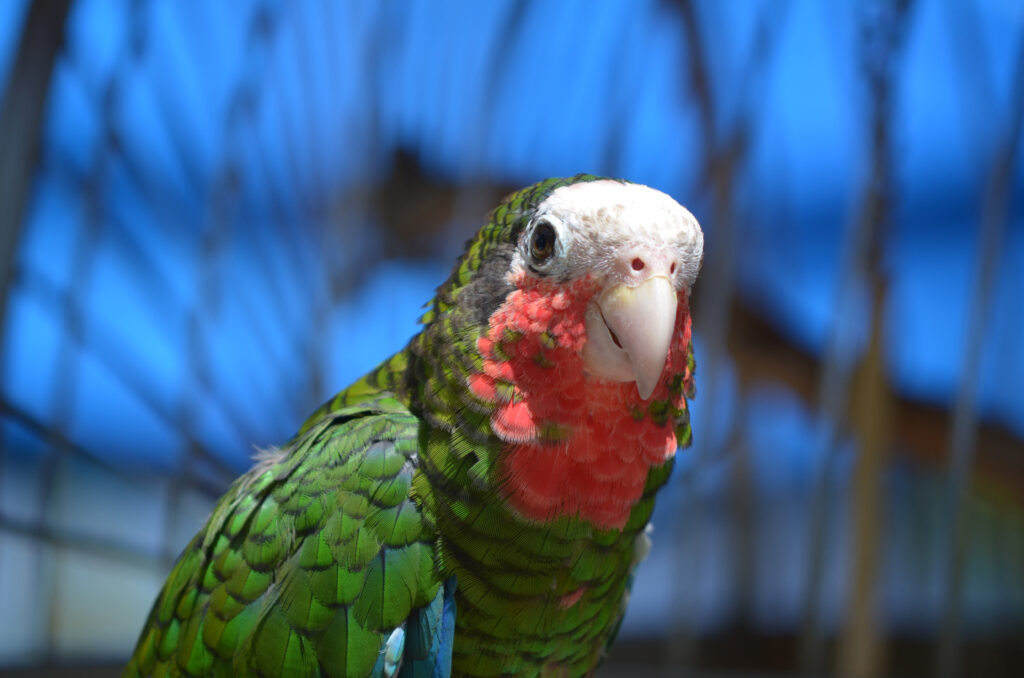
Providing proper care for your dusky conure requires attention to several key aspects of their physical and emotional wellbeing. Dusky conure care encompasses everything from appropriate housing and diet to regular health maintenance and enrichment activities.
Housing Requirements
Proper housing is a fundamental aspect of dusky conure care. These active birds need adequate space to move, climb, and play. The appropriate dusky conure cage setup should prioritize both size and safety.
For a dusky conure cage setup, consider the following guidelines:
- Minimum cage dimensions: 24″W x 24″D x 30″H (larger is always better)
- Bar spacing: 1/2″ to 3/4″ to prevent escape or injury
- Horizontal bars on at least two sides to facilitate climbing
- Secure locking mechanisms on all doors
- Non-toxic, powder-coated or stainless steel construction
- Placement away from drafts, direct sunlight, and kitchen fumes
A proper dusky conure cage setup should include multiple perches of varying diameters and materials to promote foot health and exercise. Natural wood perches like apple, willow, or manzanita are ideal, as they provide both physical and mental stimulation through safe chewing opportunities.
The bottom of the cage should feature easy-to-clean removable trays, with cage liners changed regularly as part of routine dusky conure care. Position the cage in a room where the bird can observe family activities while having a quiet corner to retreat to when needed.
Dusky Conure Diet
Nutrition is perhaps the most critical aspect of dusky conure care. A proper dusky conure diet consists of a varied mix of foods that provide complete nutrition while mimicking their natural foraging behaviors.
An optimal dusky-conure diet should include:
- High-quality pellets (60-70%): Choose a formulation specifically designed for small to medium parrots. Pellets provide consistent nutrition and should form the foundation of the dusky-conure diet.
- Fresh vegetables (20-30%): Dark leafy greens like kale, spinach, and Swiss chard should be offered daily. Other suitable vegetables include carrots, sweet potatoes, broccoli, bell peppers, and squash.
- Limited fresh fruits (10%): While fruits are enjoyed by dusky-conures, they should be limited due to their sugar content. Appropriate options include apples, berries, melons, and papaya.
- Occasional nuts and seeds: While seeds are high in fat, small amounts can be offered as treats or training rewards. Suitable options include unsalted almonds, walnuts, and sunflower seeds.
- Sprouted grains and legumes: These provide excellent nutrition and can be included regularly in the dusky-conure diet.
Foods to avoid in the dusky-conure diet include:
- Avocado (toxic to birds)
- Chocolate
- Caffeine
- Alcohol
- Salty or high-fat human foods
- Onions and garlic
- Apple seeds and fruit pits (contain cyanide compounds)
Fresh, clean water should always be available and changed daily as part of basic dusky conure care. Some owners choose to supplement their bird’s diet with commercially available vitamin solutions, although this is generally unnecessary with a balanced diet.
Exercise and Enrichment
Physical activity and mental stimulation are crucial components of dusky-conure care. These intelligent birds need daily opportunities for exercise and enrichment to maintain their physical and psychological health.
Essential elements of exercise and enrichment for dusky-conures include:
- Daily out-of-cage time: A minimum of 2-4 hours supervised time outside the cage allows for flight (if not clipped), climbing, and exploration.
- Appropriate toys: Rotate a variety of chew toys, puzzle toys, foraging toys, and climbing apparatuses to keep your dusky-conure engaged. Different textures and materials provide diverse sensory experiences.
- Social interaction: Regular handling, talking, and playing with your dusky-conure fulfills their social needs. Teaching tricks and commands provides mental stimulation.
- Foraging opportunities: Hide treats in toys or create simple foraging puzzles to encourage natural behaviors. Commercial foraging toys are available, or you can make your own using safe materials.
- Varied perches and climbing structures: Different diameters, textures, and configurations of perches provide physical exercise and foot health benefits.
Remember that a bored dusky-conure may develop behavioral problems like excessive screaming, feather plucking, or aggression. Regular enrichment is not just for entertainment but is a critical aspect of dusky-conure care and wellbeing.
Grooming and Hygiene
Regular grooming is an important part of dusky-conure care that helps maintain their physical health and appearance. While these birds naturally preen themselves, they benefit from certain grooming assistance from their owners.
Standard grooming procedures in dusky-conure care include:
- Bathing: Offer a shallow dish of water or mist your dusky-conure with room-temperature water 2-3 times per week. Many enjoy showering with their owners or playing in wet greens.
- Nail trimming: Overgrown nails can cause discomfort and increase the risk of foot problems. If natural perches don’t keep nails worn down, they should be trimmed by an experienced person or avian veterinarian.
- Wing clipping: This optional procedure limits flight capability. Discuss with an avian veterinarian whether wing clipping is appropriate for your dusky conure and living situation.
- Beak maintenance: Healthy dusky conures typically maintain their own beaks through normal chewing activities. If the beak appears overgrown or abnormal, consult an avian veterinarian.
Regular grooming sessions also provide an opportunity to check your dusky conure for any signs of health issues such as unusual growths, abnormal droppings, or changes in behavior.
Dusky-Conure Health Considerations
Maintaining the health of your dusky-conure requires preventative care, awareness of common health issues, and regular veterinary check-ups. Dusky-conures are generally hardy birds, but like all parrots, they can be susceptible to certain conditions.
Common Health Issues
As part of responsible dusky-conure care, owners should be familiar with potential health problems that may affect their pet. Common health issues in dusky-conures include:
- Psittacosis (parrot fever): A bacterial infection that can be transmitted between birds and humans. Symptoms include lethargy, respiratory distress, and watery droppings.
- Polyomavirus: A viral infection particularly dangerous to young birds. Vaccination is available and recommended for dusky-conures.
- Nutritional deficiencies: Improper diet can lead to various health issues, including vitamin A deficiency, which is common in seed-only diets.
- Respiratory infections: These can develop from exposure to drafts, poor air quality, or bacterial/fungal pathogens.
- Feather plucking: Often a sign of psychological distress, boredom, or underlying health issues in dusky-conures.
- Intestinal parasites: Regular fecal examinations can detect and address parasitic infections before they cause serious health problems.
Veterinary Care
Regular veterinary check-ups are an essential part of dusky-conure care. Find an avian veterinarian experienced with parrots and schedule annual wellness exams. These preventative visits typically include:
- Physical examination
- Weight monitoring
- Fecal analysis
- Beak and nail assessment
- Nutritional counseling
- Behavioral evaluation
New dusky conure owners should schedule an initial examination shortly after acquisition to establish a baseline of health and address any immediate concerns.
Signs of Illness
Recognizing signs of illness early is crucial in dusky-conure care. Birds naturally hide symptoms of illness as a survival mechanism, so by the time symptoms are obvious, the condition may be advanced. Contact your veterinarian immediately if you notice:
- Changes in droppings (color, consistency, frequency)
- Decreased appetite or water consumption
- Fluffed-up appearance (especially during waking hours)
- Lethargy or unusual sleepiness
- Respiratory sounds (clicking, wheezing, tail bobbing)
- Discharge from eyes, nares, or mouth
- Changes in behavior or vocalizations
- Weight loss
- Difficulty perching or balance issues
Maintaining a health journal for your dusky conure can help you track patterns and provide valuable information to your veterinarian in case of illness.
Training Your Dusky-Conure
Dusky conure training is an enjoyable and rewarding process that strengthens the bond between bird and owner while providing mental stimulation for these intelligent creatures. Training should be approached with patience, consistency, and positive reinforcement techniques.
Basic Training Tips
Effective dusky-conure training begins with understanding their natural behaviors and motivations. These social birds are generally receptive to training when approached correctly.
Start dusky conure training with these fundamentals:
- Establish trust: Before beginning any training, ensure your dusky-conure is comfortable with handling and being near you.
- Use positive reinforcement: Reward desired behaviors with treats, praise, or attention. Never punish your bird for undesired behaviors or failure to perform.
- Keep sessions short: Limit training sessions to 5-15 minutes to maintain engagement and prevent frustration.
- Be consistent: Use the same commands and rewards consistently so your dusky-conure understands expectations.
- Train when your bird is alert: Choose times when your dusky-conure is naturally active and attentive for optimal learning.
Step-Up Training
The “step-up” command is the foundation of all dusky conure training. This basic command teaches your bird to willingly step onto your finger or hand when prompted, which is essential for handling and further training.
To teach step-up to your dusky-conure:
- Hold your finger (or a perch initially if the bird is nervous) horizontally at mid-chest level of the bird.
- Gently press against its lower body (above the feet) while saying “step up” in a clear, consistent voice.
- When the dusky conure steps onto your finger, offer praise and a small treat.
- Practice regularly, gradually increasing the distance the bird must step to reach your finger.
Dusky-Conure Talking Ability
The dusky-conure talking ability is moderate compared to larger parrots. While they may not develop the extensive vocabularies of African greys or Amazon parrots, many dusky-conures can learn to mimic words and simple phrases with consistent training.
The dusky conure talking ability varies significantly between individuals. Some birds may learn several dozen words and phrases, while others may only master a few simple sounds or none at all. When training your dusky conure to talk:
- Choose simple words to start with (e.g., “hello,” the bird’s name, “good bird”)
- Repeat target words frequently during daily interactions
- Speak clearly and maintain a consistent tone
- Reward any attempts at mimicry immediately
- Practice during quiet times when the bird is attentive
- Be patient, as developing dusky conure talking ability takes time
The dusky conure talking ability generally begins to develop between 6 months to 1 year of age, though some birds may start earlier or later. Their vocalizations tend to have a slightly scratchy or squeaky quality rather than the clear pronunciation of larger parrots.
Trick Training
Beyond basic commands, many dusky conures enjoy learning tricks that showcase their intelligence and dexterity. Popular tricks to teach include:
- Wave: Train your dusky conure to lift its foot and wave on command.
- Turn around: Teach your bird to spin in a circle on its perch.
- Retrieve: Some dusky conures can learn to pick up small objects and bring them to their owner.
- Target training: Touch a target stick with their beak, which can lead to more complex behaviors.
- Play dead: Lie on their back in your hand (though this should only be attempted with very well-trained and trusting birds).
Use the same positive reinforcement techniques for trick training as with basic commands. Break complex behaviors into smaller steps and reward progress consistently.
Dusky Conure vs Green Cheek Conure: A Comparison
Potential bird owners often find themselves choosing between the dusky conure and its close relative, the green cheek conure. Understanding the similarities and differences helps in making an informed decision that matches your lifestyle and preferences.
Physical Differences
When comparing dusky conure vs green cheek conures, several physical distinctions are noticeable:
- Size: The dusky conure is slightly larger, averaging 10-11 inches compared to the green cheek’s 9-10 inches.
- Coloration: The most obvious difference in dusky conure vs green cheek appearance is the chest pattern. Dusky conures have a distinct scalloped or scaled pattern on their chest, while green cheeks have a solid gray or beige chest.
- Facial markings: Green cheeks have more prominent red tail feathers and maroon on their abdomens, while the dusky conure has more subtle coloration.
Temperament Differences
When comparing dusky conure vs green cheek personalities, potential owners will find subtle but noteworthy differences:
- Dusky conures are often described as slightly calmer and less nippy than green cheeks.
- Green cheeks typically have more pronounced clownish behaviors and may be more mischievous.
- Both species are affectionate, but the dusky conure may be marginally more cuddly with bonded owners.
- Energy levels are comparable, with both species requiring similar levels of interaction and exercise.
Care Differences
The care requirements when comparing dusky conure vs green cheek conures are nearly identical:
- Both require similar cage sizes, diets, and enrichment activities.
- Lifespan expectations are comparable at 20-30 years for both species.
- Health concerns and veterinary needs are essentially the same.
- Both adapt well to similar household environments and noise considerations.
The choice between a dusky conure vs green cheek often comes down to personal preference regarding appearance and subtle personality traits rather than significant differences in care requirements.
Acquiring a Dusky Conure: What to Consider
Before bringing a dusky conure into your home, several important factors deserve careful consideration. From where to find your new pet to evaluating breeders and preparing your home, these decisions significantly impact your experience as a dusky conure owner.
Dusky Conure Price
The dusky conure price varies depending on age, coloration, tameness, and geographical location. In the United States, the typical dusky conure price range is:
- Baby hand-fed dusky conures: $350-$600
- Young weaned dusky conures: $300-$500
- Adult dusky conures: $250-$450
The dusky conure price at specialty bird shops is typically higher than from private breeders. Additional factors affecting dusky conure price include:
- Training level (talking ability, tricks, etc.)
- Pedigree and breeding history
- Health testing and veterinary certifications
- Included supplies (cage, food, toys)
Beyond the initial dusky conure price, prospective owners should budget for ongoing costs, including:
- Quality cage and accessories: $200-$500
- Annual food costs: $300-$500
- Toys and enrichment items: $200-$300 annually
- Veterinary care: $100-$300 annually for routine care, more for emergencies
These figures demonstrate that the initial dusky conure price represents only a fraction of the lifetime cost of ownership.
Where to Find Dusky Conures for Sale
When looking for a dusky conure for sale, several options exist, each with advantages and considerations:
Reputable Breeders
Searching for a dusky conure for sale from a reputable breeder often provides the best start for a healthy, well-socialized bird. When evaluating breeders offering a dusky conure for sale, consider:
- Breeder reputation and experience
- Cleanliness of breeding facility
- Health guarantees and return policies
- Willingness to answer questions and provide references
- Evidence of proper socialization and hand-feeding
Reputable breeders typically allow visits to their facility and provide ongoing support for new owners.
Rescue Organizations
For those open to adopting an adult bird, rescue organizations sometimes have a dusky conure for sale or adoption. Benefits of rescue adoption include:
- Lower cost compared to buying a baby bird
- Adult personality already established
- Potential to provide a second chance to a bird in need
- Support from rescue organization volunteers
Challenges may include behavioral issues from previous experiences, though many rescued dusky conures adjust wonderfully to new homes with patience and consistency.
Pet Stores
While some pet stores offer a dusky conure for sale, this option generally carries more risks:
- Unknown breeding conditions
- Potentially less socialization
- Limited health history
- Variable quality of care before purchase
If considering a pet store dusky conure for sale, look for stores specializing in birds with knowledgeable staff and clean, appropriate housing conditions.
Dusky Conure Adoption Considerations
Dusky conure adoption from rescues or shelters provides a second chance for birds who need homes. When considering dusky conure adoption, potential owners should:
- Research the bird’s background when possible
- Understand any known behavioral issues
- Be prepared for potential adjustment periods
- Recognize that adult birds may take longer to bond than hand-raised babies
Many organizations specializing in dusky conure adoption provide excellent resources for new owners, including training guidance and support groups. These organizations typically conduct thorough screenings to ensure appropriate matches between birds and adoptive homes.
Preparing Your Home
Before bringing home your dusky conure, proper preparation is essential:
- Set up the cage in a quiet but social area of your home
- Install appropriate perches, toys, and feeding stations
- Bird-proof the room where the cage will be located
- Purchase appropriate food and treats
- Find an avian veterinarian before bringing your bird home
- Establish a relationship with experienced dusky conure owners for advice
Having these elements in place before your dusky conure arrives helps ensure a smooth transition to their new environment.
Conclusion: Is a Dusky Conure Right for You?
The dusky conure makes an excellent companion for the right owner. These charming, intelligent birds offer a perfect middle ground between the smaller, quieter parrots and the more demanding larger species. Their moderate size, manageable noise level, and affectionate dusky conure personality have earned them a devoted following among bird enthusiasts.
However, responsible ownership requires understanding that the dusky conure is a long-term commitment. With a dusky conure lifespan of 20-30 years, these birds will be part of your family for decades, requiring consistent care, attention, and financial resources throughout their lives.
The ideal dusky conure owner:
- Can dedicate several hours daily to interaction and care
- Is prepared for a multi-decade commitment
- Can provide appropriate housing, diet, and enrichment
- Has realistic expectations about dusky conure talking ability and behavior
- Understands the financial responsibilities of bird ownership
- Has researched avian veterinarians in their area
- Is patient and consistent with training and socialization
If you can meet these requirements, a dusky conure can bring joy, companionship, and entertainment to your life for many years to come. Their playful antics, affectionate nature, and beautiful appearance make them wonderful companions for committed bird lovers.
For more information about bird ownership and pet care, visit PetsPump.com to explore our comprehensive guides on responsible pet ownership and animal care.
Resources for Dusky Conure Owners
- Avian Veterinarians Directory – Find qualified bird veterinarians
- Association of Avian Veterinarians – Educational resources for bird health
- BirdTricks – Training resources for parrot owners
- Lafeber – Nutritional information and products
- World Parrot Trust – Conservation and education
Frequently Asked Questions About Dusky Conures
How long do dusky conures live?
The average dusky conure lifespan ranges from 20-30 years with proper care, nutrition, and veterinary attention.
Are dusky conures good talkers?
The dusky conure talking ability is moderate. While not as proficient as larger parrots, many can learn a limited vocabulary of words and phrases with consistent training.
How much does a dusky conure cost?
The typical dusky conure price ranges from $300-$600 for hand-fed babies, with additional costs for cage, supplies, and ongoing care.
Are dusky conures loud?
The dusky conure noise level is moderate compared to larger parrots, making them more suitable for apartment living than macaws or cockatoos.
Do dusky conures make good pets for beginners?
Yes, with proper research and commitment, dusky conures can be excellent first birds due to their manageable size and generally friendly temperament.
What’s the difference between dusky conures and green cheek conures?
In the dusky conure vs green cheek comparison, duskies are slightly larger with more pronounced chest scaling, while green cheeks have more vibrant tail coloration.
How big of a cage does a dusky conure need?
A minimum cage size of 24″W x 24″D x 30″H is recommended for a dusky conure, with larger always being better for their health and happiness.
Can dusky conures be kept with other birds?
While some dusky conures can cohabitate with compatible species or conures, introductions should be slow and supervised, with separate cages initially.
How often should a dusky conure see a veterinarian?
Annual wellness exams are recommended for dusky conures, with more frequent visits for young birds or those with health concerns.
Do dusky conures require companion birds?
No, unlike some species, dusky conures bond strongly with their human caregivers and don’t necessarily require avian companions if given adequate attention and interaction.



